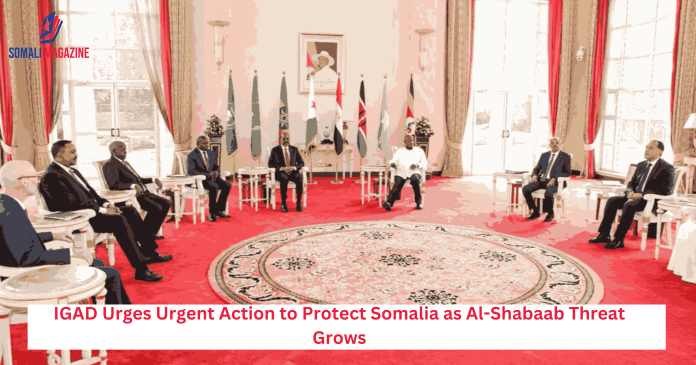Facebook Twitter (X) Instagram Somali Magazine - People's Magazine
Call for 8,000 Troop Surge and Emergency Funding as Security and Humanitarian Conditions Deteriorate
The Intergovernmental Authority on Development (IGAD) has raised the alarm over worsening security in Somalia. They’re calling for the quick deployment of 8,000 more peacekeeping troops and immediate international funding to help stabilize the country. IGAD says the recent increase in Al-Shabaab attacks is threatening to undo years of hard-won progress.
At a key ministerial meeting held on Thursday in Kampala, IGAD’s Executive Secretary, Dr. Workneh Gebeyehu, warned that Somalia’s security situation has reached a critical point. He praised Somali and allied forces for standing strong, but he also pointed out that their supply lines are stretched thin. Commanders are having to make tough decisions because they don’t have enough fuel, ammunition, or even basic supplies like food and water.
The African Union Support and Stabilization Mission in Somalia (AUSSOM), which replaced the older ATMIS mission at the beginning of 2025, is struggling due to a serious funding shortfall. The mission is short by $96 million. Right now, only 75% of what it needs to operate is being provided through the United Nations, leaving a big gap in what’s needed for logistics and supplies.
Adding to the crisis, Al-Shabaab launched a major wave of attacks earlier this year. They captured key towns like Adan Yabal and Wargaadhi in the Middle Shabelle region and disrupted supply routes in areas like Galgudud, Hiraan, and Mudug. These attacks, known as “Operation Ramadan,” have taken back territory that Somali forces had previously secured, reversing some of their recent victories.
The violence has also worsened the humanitarian crisis in Somalia. Over 2.9 million people are now displaced from their homes. Basic services like healthcare, schools, and farming support have been badly affected, especially in areas controlled by Al-Shabaab. Amnesty International says the situation is very serious for the people living in these regions.
The Kampala summit brought together senior officials and military leaders from countries that contribute troops to the mission. After two days of discussions, they came up with several key recommendations:
-
Send 8,000 new troops immediately
-
Increase air support and intelligence-sharing
-
Train and recruit more local defense forces
-
Improve coordination between federal and regional forces
-
Set up a Peer Review Mechanism to monitor progress
Dr. Gebeyehu also encouraged regional governments to open new logistics hubs to support military operations. He called on donors from around the world to hold a focused summit and provide the funding urgently needed to continue the mission.
He made it clear that the Somali people aren’t focused on what the mission is called. What matters to them is that it keeps their families and children safe. He stressed the need for unity and collective action among the regional leaders, saying this wasn’t the time for just reading speeches, but for taking real steps to improve the situation.
The meeting also touched on the rising tensions between Somalia and Ethiopia. The conflict began after Ethiopia made a maritime agreement with Somaliland — a move Somalia considers illegal. In response, Egypt offered military support to Somalia, shifting regional alliances. Turkey stepped in as a mediator in December 2024, resulting in the Ankara Declaration. This agreement aimed to cool down tensions and promote dialogue, including talks on Ethiopia’s possible access to the sea through Somalia. However, Ethiopia has not yet officially backed away from its deal with Somaliland, which continues to worry the Somali government.
IGAD warned that unless these political tensions are addressed — along with military and funding issues — efforts to stabilize Somalia could be at risk.
Dr. Gebeyehu ended his speech with a strong message: “This is the time to be honest with each other and say — we can, and we must, do better.” He said Somalia’s peace, and the wider region’s security, depend on it.

